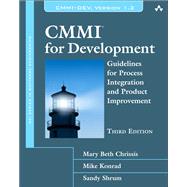
Note: Supplemental materials are not guaranteed with Rental or Used book purchases.
Purchase Benefits
Looking to rent a book? Rent CMMI for Development Guidelines for Process Integration and Product Improvement [ISBN: 9780321711502] for the semester, quarter, and short term or search our site for other textbooks by Chrissis, Mary Beth; Konrad, Mike; Shrum, Sandra. Renting a textbook can save you up to 90% from the cost of buying.
Mary Beth Chrissis is a senior member of the technical staff at the Software Engineering Institute (SEI). Since joining the SEI in 1988, Chrissis has been a coauthor of the Capability Maturity Model Integration for Development (CMMI-DEV) and Capability Maturity Model for Software (SW-CMM) models. Currently, Chrissis chairs the CMMI Configuration Control Board (CCB), is a member of the IEEE Software and Systems Engineering Standards Executive Committee, and is an instructor of various CMMI model-related courses at the SEI. Prior to joining the SEI, Chrissis worked at GTE Government Systems in Rockville, Maryland; Dravo Automation Sciences in Pittsburgh, Pennsylvania; and Sperry Corporation in Great Neck, New York. Before coming to the SEI, Chrissis was pursuing her M.S. in computer science from Johns Hopkins University, and in 1983 she received a B.S. from Carnegie Mellon University.
Mike Konrad is a senior member of the technical staff and has been at the Software Engineering Institute (SEI) at Carnegie Mellon University since 1988. Dr. Konrad is the Chief Architect of CMMI and Manager of SEI’s CMMI Modeling Team. Previously, he was Chair of the CMMI Configuration Control Board (2001-2006) and a member of the International Process Research Consortium (2004-2006). Also, he was a member of the teams that developed the original Software CMM Version 1.0 (1988-1991) and ISO 15504 (1993-1997). Prior to joining the SEI, Konrad worked with several companies in computer science-related positions, including ISSI, SAIC, and Honeywell and briefly with George Mason University and the University of Maryland. He obtained his Ph.D. in mathematics in 1978 from Ohio University, Athens, Ohio.
Sandy Shrum is a senior writer/editor and communications point of contact for the Software Engineering Process Management program at the Software Engineering Institute (SEI). Besides this book, she has coauthored two other CMMI books: CMMI®-ACQ: Guidelines for Improving the Acquisition of Products and Services (Addison-Wesley, 2009) and CMM® for Services: Guidelines for Superior Service, Second Edition (Addison-Wesley, 2007). She has been with the SEI since 1995 and has been a member of the CMMI Development Team since the CMMI project’s inception in 1998. Her roles on the project have included model author, small review team member, reviewer, editor, model development process coordinator, and quality assurance process owner. Before joining the SEI, Sandy worked for eight years with Legent Corporation, a Virginia-based software company. Her experience as a technical communicator dates back to 1988, when she earned her M.S. in professional writing from Carnegie Mellon University. Her undergraduate degree, a B.S. in business administration, was earned at Gannon University, Erie, Pennsylvania.
List of Perspectives xiii
Preface xv
Book Acknowledgments xxi
Part One: About CMMI for Development 1
Chapter 1: Introduction 3
About Process Improvement 4
About Capability Maturity Models 9
Evolution of CMMI 10
CMMI Framework 14
CMMI for Development 18
Chapter 2: Process Area Components 19
Core Process Areas and CMMI Models 19
Required, Expected, and Informative Components 19
Components Associated with Part Two 20
Supporting Informative Components 25
Numbering Scheme 26
Typographical Conventions 27
Chapter 3: Tying It All Together 31
Understanding Levels 31
Structures of the Continuous and Staged Representations 32
Understanding Capability Levels 34
Understanding Maturity Levels 41
Process Areas 46
Equivalent Staging 49
Achieving High Maturity 52
Chapter 4: Relationships Among Process Areas 59
Process Management 60
Project Management 64
Engineering 68
Recursion and Iteration of Engineering Processes 74
Support 77
Chapter 5: Using CMMI Models 85
Adopting CMMI 90
Your Process Improvement Program 94
Selections that Influence Your Program 98
CMMI Models 99
Interpreting CMMI When Using Agile Approaches 100
Using CMMI Appraisals 104
Appraisal Requirements for CMMI 105
SCAMPI Appraisal Methods 105
Appraisal Considerations 106
CMMI Related Training 107
Chapter 6: Essays and Case Studies 113
Case Studies 113
Essays 137
Part Two: Generic Goals and Generic Practices, and the Process Areas 163
Generic Goals and Generic Practices 165
Causal Analysis and Resolution 233
Configuration Management 243
Decision Analysis and Resolution 257
Integrated Project Management 267
Measurement and Analysis 287
Organizational Process Definition 303
Organizational Process Focus 317
Organizational Performance Management 331
Organizational Process Performance 351
Organizational Training 365
Product Integration 377
Project Monitoring and Control 393
Project Planning 403
Process and Product Quality Assurance 425
Quantitative Project Management 433
Requirements Development 455
Requirements Management 473
Risk Management 481
Supplier Agreement Management 497
Technical Solution 509
Validation 531
Verification 541
Part Three: The Appendices 553
Appendix A: References 555
Appendix B: Acronyms 561
Appendix C: CMMI Version 1.3 Project Participants 565
Appendix D: Glossary 573
Book Contributors 605
Index 623
The New copy of this book will include any supplemental materials advertised. Please check the title of the book to determine if it should include any access cards, study guides, lab manuals, CDs, etc.
The Used, Rental and eBook copies of this book are not guaranteed to include any supplemental materials. Typically, only the book itself is included. This is true even if the title states it includes any access cards, study guides, lab manuals, CDs, etc.